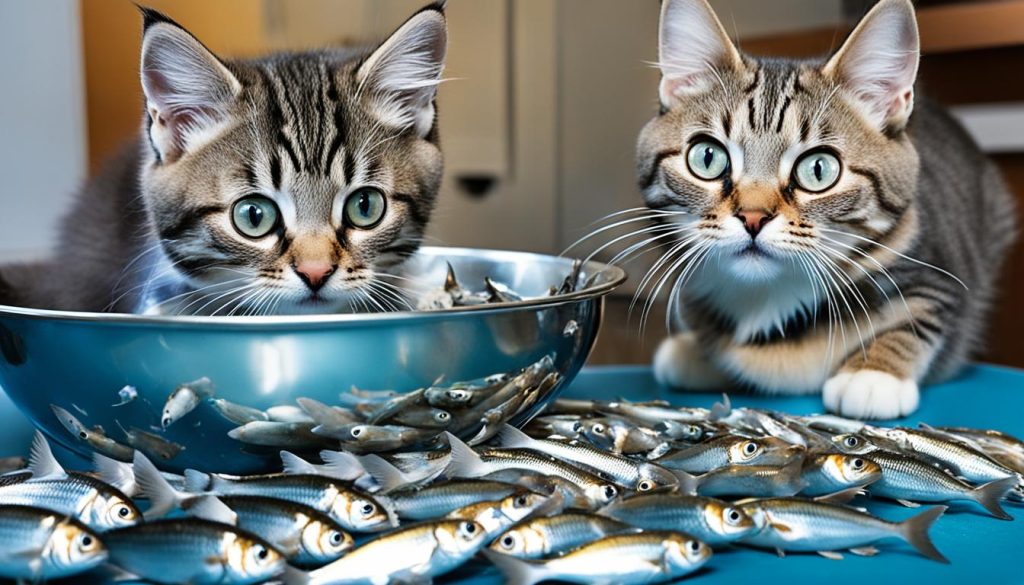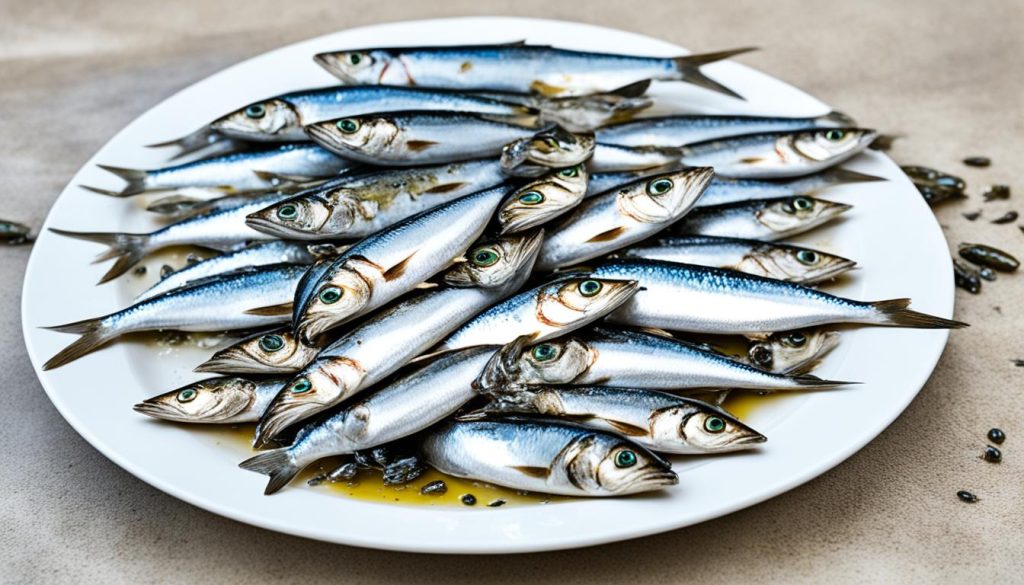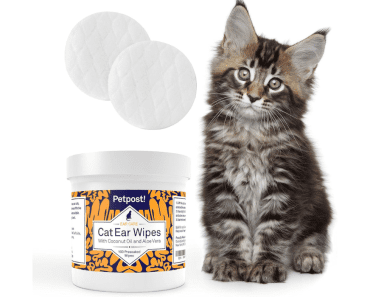As a cat owner, you may have wondered: can cats eat sardines? I’m here to provide you with some insightful tips on this topic. The good news is that cats can safely eat sardines and there are several benefits to including them in their diet.
Sardines are packed with essential nutrients that are important for a cat’s overall health and well-being. These little fish are rich in Omega-3 fatty acids, protein, and taurine. Omega-3 fatty acids promote healthy skin and coat, while taurine is crucial for maintaining good heart and eye health in cats. The protein content in sardines also helps support muscle development and provides energy.
It’s important to note that while sardines can be a nutritious addition to your cat’s diet, they should be fed in moderation. A small sardine once or twice a week is sufficient for an average-sized adult cat. Feeding sardines as an occasional treat or snack ensures that your cat gets the benefits without overdoing it.
When choosing sardines for your cat, opt for those packed in water rather than oil. While the oil is not necessarily harmful, it can introduce excess fat into your cat’s diet, potentially leading to obesity. Additionally, certain oils, such as garlic-infused ones, can be toxic to cats. If you do choose sardines packed in oil, be sure to rinse them thoroughly to remove any excess oil before feeding them to your cat.
It’s also best to avoid feeding your cat canned sardines in tomato sauce. The sauce often contains spices and additives that could disrupt your cat’s digestive system, and some cats may have allergies to tomatoes. In comparison to canned tuna, sardines are a better choice for cats as they provide a higher content of the essential nutrient taurine and generally have lower levels of mercury.
Can Cats Eat Sardines? Yes, they can once in a while.
- Cats can safely eat sardines and benefit from their essential nutrients.
- Feed sardines in moderation, as an occasional treat or snack.
- Choose sardines packed in water rather than oil to avoid excessive fat intake.
- Avoid canned sardines in tomato sauce, which may contain spices and additives.
- Sardines are a better choice than canned tuna for cats due to lower mercury levels and higher taurine content.
Can Kittens Eat Sardines? What is the Appropriate Amount of Sardines for Cats?
Kittens can safely enjoy the benefits of sardines in their diet, but it’s crucial to feed them in the appropriate amount. While sardines offer essential nutrients, they should not make up a significant portion of a kitten’s food. Instead, sardines are best given as an occasional treat or snack.
For an average-sized adult cat, a small sardine once or twice a week is sufficient. However, when it comes to kittens, it’s important to consider their smaller size and developing dietary needs. As a general guideline, a kitten can be given a small portion of a sardine once a week. Consulting with a veterinarian is recommended to determine the appropriate serving size for your specific kitten.
Feeding kittens an appropriate amount of sardines helps ensure they receive the benefits without overwhelming their diet. Sardines provide valuable nutrients like Omega-3 fatty acids, protein, and taurine, which contribute to their overall health and well-being.

Remember, while it can be tempting to give your kitten more sardines, moderation is key. A balanced diet consisting of high-quality kitten food is crucial for their growth and development. Sardines should be viewed as a supplemental treat rather than a staple in their diet.
Giving your kitten an appropriate amount of sardines not only provides them with a flavorful treat but also introduces them to different tastes and textures. However, always monitor your kitten’s health and consult with a veterinarian if you have any specific concerns or questions about their dietary needs.
Should I Choose Sardines in Water or Oil for My Cat?
When it comes to choosing sardines for your cat, you might wonder whether it’s better to go for those packed in water or oil. While both options are safe for cats to consume, there are a few factors to consider that might make sardines in water the preferable choice.
Sardines packed in water have some advantages over those packed in oil. One of the main concerns with sardines in oil is the higher fat content. Although fat is an essential part of a cat’s diet, excessive consumption can lead to weight gain and obesity. Opting for sardines in water helps reduce the amount of fat your cat consumes, promoting a healthier balance in their diet.
Another reason to choose sardines in water is that some oils, particularly those infused with garlic, can be toxic to cats. By avoiding sardines packed in oil, you can eliminate the risk of exposing your beloved feline companion to any potentially harmful substances.
If you do decide to feed your cat sardines packed in oil, it’s important to take precautions. Make sure to thoroughly rinse the sardines before offering them to your cat, as this will help remove excess oil. By doing so, you can mitigate the risk of your cat ingesting too much oil and potentially experiencing digestive issues.
When it comes to choosing between sardines in water or oil for your cat, opting for those packed in water may be the better choice. Water-packed sardines help promote a healthier balance in your cat’s diet, reducing the risk of weight gain and obesity. Additionally, by avoiding sardines packed in oil, you eliminate the potential exposure to toxic substances present in certain oils. If you do choose sardines in oil, make sure to rinse them thoroughly before feeding them to your cat.

Is It Safe to Feed Canned Tomato Sardines to My Cat? Are Canned Sardines a Better Choice Than Canned Tuna for Cats?
When it comes to feeding your cat canned sardines, it’s important to avoid those packed in tomato sauce. While sardines can be a nutritious addition to your cat’s diet, the tomato sauce often contains spices and additives that could disrupt your cat’s digestive system. Additionally, some cats may have allergies to tomatoes, which can lead to discomfort or even more serious reactions.
Instead, opt for sardines packed in water or packed in their own juices. These options provide a healthier choice for your cat, without any potentially harmful additives or allergens. It’s always best to check the ingredient list and choose a variety that is free from unnecessary spices or flavorings.
Comparing canned sardines to canned tuna, sardines are generally considered a better choice for cats. While both sardines and tuna can be a good source of protein and essential nutrients, such as Omega-3 fatty acids, sardines offer certain advantages.
One key advantage is the lower risk of mercury contamination in sardines compared to tuna. Tuna, especially albacore tuna, tends to have higher levels of mercury, which can accumulate in a cat’s system over time and potentially lead to health issues. By choosing canned sardines instead, you can reduce the risk of exposing your cat to excessive amounts of mercury.
In addition to lower mercury levels, canned sardines also provide a higher content of taurine, an essential nutrient for cats. Taurine plays a crucial role in maintaining a cat’s heart health, vision, and overall well-being, making it an important addition to their diet.
When serving canned sardines to your cat, it’s always a good idea to ensure that the fish is properly rinsed and drained to remove any excess salt or oil. This will help prevent potential digestive issues and reduce the intake of unnecessary additives.
Remember, while canned sardines can be a healthy and tasty treat for your cat, moderation is key. They should be given as an occasional supplement to their regular cat food and not as a primary source of nutrition. It’s always best to consult with a veterinarian regarding the appropriate portion size and feeding frequency for your individual cat.
How to Give Sardines to Your Cat and Risks Associated with Giving Cats Sardines
When it comes to giving sardines to your cat, there are a few things to keep in mind. Firstly, it’s best to choose sardines preserved in spring water if possible. This helps minimize the amount of oil or saltwater your cat consumes. If you can only find sardines preserved in oil or saltwater, make sure to rinse them thoroughly before serving them to your furry friend.
It’s important to remember that sardines should only be given to cats as occasional treats. While they provide numerous health benefits, including essential nutrients like Omega-3 fatty acids and protein, excessive consumption can lead to mercury poisoning. To avoid this, it’s crucial to limit your cat’s intake of sardines and opt for a balanced diet that includes a variety of other cat-friendly foods.
In addition to mercury poisoning, there are a few other risks associated with giving cats sardines. One potential hazard is choking on small bones found in some canned sardines. To prevent this, ensure you remove any bones before serving the sardines to your cat. Another risk to be aware of is the potential for increased mercury levels in sardines sourced from polluted waters. Regular monitoring of your cat’s health and consulting with a veterinarian can help address any concerns related to sardine consumption.






